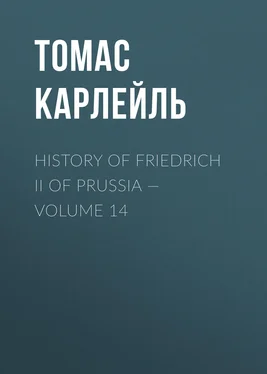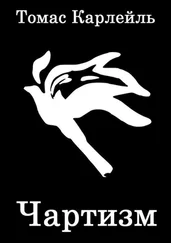Томас Карлейль - History of Friedrich II of Prussia — Volume 14
Здесь есть возможность читать онлайн «Томас Карлейль - History of Friedrich II of Prussia — Volume 14» — ознакомительный отрывок электронной книги совершенно бесплатно, а после прочтения отрывка купить полную версию. В некоторых случаях можно слушать аудио, скачать через торрент в формате fb2 и присутствует краткое содержание. Жанр: foreign_prose, История, literature_19, foreign_edu, foreign_antique, на английском языке. Описание произведения, (предисловие) а так же отзывы посетителей доступны на портале библиотеки ЛибКат.
- Название:History of Friedrich II of Prussia — Volume 14
- Автор:
- Жанр:
- Год:неизвестен
- ISBN:нет данных
- Рейтинг книги:5 / 5. Голосов: 1
-
Избранное:Добавить в избранное
- Отзывы:
-
Ваша оценка:
- 100
- 1
- 2
- 3
- 4
- 5
History of Friedrich II of Prussia — Volume 14: краткое содержание, описание и аннотация
Предлагаем к чтению аннотацию, описание, краткое содержание или предисловие (зависит от того, что написал сам автор книги «History of Friedrich II of Prussia — Volume 14»). Если вы не нашли необходимую информацию о книге — напишите в комментариях, мы постараемся отыскать её.
History of Friedrich II of Prussia — Volume 14 — читать онлайн ознакомительный отрывок
Ниже представлен текст книги, разбитый по страницам. Система сохранения места последней прочитанной страницы, позволяет с удобством читать онлайн бесплатно книгу «History of Friedrich II of Prussia — Volume 14», без необходимости каждый раз заново искать на чём Вы остановились. Поставьте закладку, и сможете в любой момент перейти на страницу, на которой закончили чтение.
Интервал:
Закладка:
"Belleisle, tormented with rheumatic nerves, and of violent temper at any rate, compresses the immense waste rage that is in him. His answers to Broglio are calm and low-voiced; admirable to Valori. One thing he wished to ascertain definitely: What M. de Broglio's intentions were; and whether he would, or would not, go to Bavaria and take charge there? If so, he shall have all the Cavalry for escort; Cavalry, unless it be dragoons, will only eat victual in case of siege.—No, Broglio will not go with Cavalry; must have those Ten Battalions, must have Sign-manual; won't, in short!"—Will stay, then, thinks Belleisle; and one must try to drive him, as men do pigs, covertly and by the rule of contraries, while Prag falls under Siege.
What an outlook for his Most Christian Majesty's service,—fatal altogether, had not Belleisle been a high man, and willing to undertake pig-driving!... "Discouragement in the Army is total, were it not for Belleisle; anger against Broglio very great. The Officers declare openly, 'We will quit, if Broglio continue General! Our commissions were made out in the name of Marechal de Belleisle [in the spring of last Year, when he had such levees, more crowded than the King's!]—we are not bound to serve another General!'—'You recognize ME for your General?' asks Belleisle. 'Yes!'—'Then, I bid you obey M. de Broglio, so long as he is here.' [Valori, i. 166.]...
"JUNE 27th. The Grand-Duke, Maria Theresa's Husband, come from Vienna to take command-in-chief, joins the Austrian main Army and his Brother Karl, this day: at Konigsaal, one march to the south of Prag. Friedrich being now off their hands, why should not they besiege Prag, capture Prag! Under Khevenhuller, with Barenklau, and the Mentzels, Trencks,—poor D'Harcourt merely storing victual,—Bavaria lies safe enough. And the Oriflamme caged in Prag:—Have at the Oriflamme!
"Prag is begirdled, straitened more and more, from this day. Formal Siege to begin, so soon [as the artillery can come up' which is not for seven weeks yet]. And so, in fine, 'AUGUST 17th, all at once,' furious bombardment bursts out, from 36 mortars and above 100 big guns, disposed in batteries around. [ Guerre de Boheme, ii. 149, 170.] To which the French, Belleisle's high soul animating everything, as furiously responded; making continual sallies of a hot desperate nature; especially, on the fifth day of the siege, one sally [to be mentioned by and by] which was very famous at Prag and at Paris."...
CONCERNING THE ITALIAN WAR WHICH SIMULTANEOUSLY WENT ON, ALL ALONG
War in Italy—the Spanish Termagant very high in her Anti-Pragmatic notions—there had been, for eight months past; and it went on, fiercely enough, doggedly enough, on both sides for Six Years more, till 1748, when the general Finis came. War of which we propose to say almost nothing; but must request the reader to imagine it, all along, as influential on our specific affairs.
The Spanish Termagant wished ardently to have the Milanese and pertinents, as an Apanage for her second Infant, Don Philip; a young gentleman who now needs to be provided for, as Don Carlos had once done. "Cannot get to be Pope this one, it appears," said the fond Mother (who at one time looked that way for her Infant,): "Well, here is the Milanese fallen loose!" Readers know her for a lady of many claims, of illimitable aspirations; and she went very high on the Pragmatic Question. "Headship of the Golden Fleece, Madam; YOU head of it? I say all Austria, German and Italian, is mine!"—though she has now magnanimously given up the German part to Kaiser Karl VII.; and will be content with the Italian, as an Apanage for Don Philip. And so there is War in Italy, and will be. To be imagined by us henceforth.
A War in which these Three Elements are noticeable as the chief. FIRST, the Sardinian Majesty, [Charles Emanuel, Victor Amadeus's Son (Hubner, t. 293): born 27th April, 1701; lived and reigned till 19th February, 1773 (OErtel, t. 77).] who is very anxious himself for Milanese parings and additaments; but, except by skilfully playing off-and-on between the French side and the Austrian, has no chance of getting any. For Spain he is able to fight; and also (on good British Subsidies) against Spain. Element SECOND is the British Navy, cruising always between Spain and the Seat of War; rendering supplies by sea impossible,—almost impossible. THIRD, the Passes of Savoy; wild Alpine chasms, stone-labyrinths; inexpugnable, with a Sardinian Majesty defending; which are the one remaining road, for Armies and Supplies, out of Spain or France.
The Savoy Passes are, in fact, the gist of the War; the insoluble problem for Don Philip and the French. By detours, by circuitous effort and happy accident, your troops may occasionally squeeze through: but without one secure road open behind them for supplies and recruitments, what good is it? Battles there are, behind the Alps, on what we may call the STAGE itself of this Italian War-theatre; but the grand steady battle is that of France and Don Philip, struggling spasmodically, year after year, to get a road through the COULISSES or side-scenes,—namely, those Savoy Passes. They try it by this Pass and by that; Pass of Demont, Pass of Villa-Franca or Montalban (glorious for France, but futile), Pass of Exilles or Col d'Assiette (again glorious, again futile and fatal); sometimes by the way of Nice itself, and rocky mule-tracks overhanging the sea-edge (British Naval-cannon playing on them);—and can by no way do it.
There were fine fightings, in the interior too, under Generals of mark; General Browne doing feats, excellent old General Feldmarschall Traun, of whom we shall hear; Maillebois, Belleisle the Younger, of whom we have heard. There was Battle of Campo-Santo, new battle there (Traun's); there was Battle of Rottofreddo; of Piacenza (doleful to Maillebois),—followed by Invasion of Provence, by Revolt of Genoa and other things: which all readers have now forgotten. [Two elaborate works on the subject are said to be instructive to military readers: Buonamici (who was in it, for a while). De Bello Italico Commentarii (in Works of Buonamici, Lyon, 1750); and Pezay, Campagnes de Maillebois (our Westphalian friend again) en Italie, 1745-1746 (Paris, 1775).] Readers are to imagine this Italian War, all along, as a fact very loud and real at that time, and continually pulsing over into our German Events (like half-audible thunder below the horizon, into raging thunder above), little as we can afford to say of it here. One small Scene from this Italian War;—one, or with difficulty two;—and if possible be silent about all the rest:
SCENE, ROADS OF CADIZ, October, 1741: BY WHAT ASTONISHING ARTIFICE THIS ITALIAN WAR DID, AT LENGTH, GET BEGUN
"The Spanish Court, that is, Termagant Elizabeth, who rules everybody there, being in this humor, was passionate to begin; and stood ready a good while, indignantly champing the bit, before the sad preliminary obstacles could be got over. At Barcelona she had, in the course of last summer, doubly busy ever since Mollwitz time, got into equipment some 15,000 men; but could not by any method get them across,—owing to the British Fleets, which hung blockading this place and that; blockading Cadiz especially, where lay her Transport-ships and War-ships, at this interesting juncture. Fleury's cunctations were disgusting to the ardent mind; and here now, still more insuperable, are the British Fleets; here—and a pest to him!—is your Admiral Haddock, blockading Cadiz, with his Seventy-fours!
"But again, on the other or Pragmatic side, there were cunctations. The Sardinian Majesty, Charles Emanuel of Savoy, holding the door of the Alps, was difficult to bargain with, in spite of British Subsidies;—stood out for higher door-fees, a larger slice of the Milanese than could be granted him; had always one ear open for France, too; in short, was tedious and capricious, and there seemed no bringing him to the point of drawing sword for her Hungarian Majesty. In the end, he was brought to it, by a stroke of British Art,—such to the admiring Gazetteer and Diplomatic mind it seemed;—equal to anything we have since heard of, on the part of perfidious Albion.
Читать дальшеИнтервал:
Закладка:
Похожие книги на «History of Friedrich II of Prussia — Volume 14»
Представляем Вашему вниманию похожие книги на «History of Friedrich II of Prussia — Volume 14» списком для выбора. Мы отобрали схожую по названию и смыслу литературу в надежде предоставить читателям больше вариантов отыскать новые, интересные, ещё непрочитанные произведения.
Обсуждение, отзывы о книге «History of Friedrich II of Prussia — Volume 14» и просто собственные мнения читателей. Оставьте ваши комментарии, напишите, что Вы думаете о произведении, его смысле или главных героях. Укажите что конкретно понравилось, а что нет, и почему Вы так считаете.









